Key takeaways:
- Reparations politics involves addressing historical injustices and requires societal acknowledgment beyond financial compensation.
- Supporting Black-owned businesses fosters economic empowerment and preserves cultural identities, contributing to systemic change.
- Community engagement is essential for building networks, sharing knowledge, and transforming individual efforts into collective power.
- Building lasting relationships with businesses enhances support and encourages community investment, creating a shared vision for success.

Understanding reparations politics
Reparations politics is a complex and often contentious issue that revolves around addressing historical injustices faced by Black communities, such as slavery and systemic racism. I often reflect on the emotional weight this topic carries; it’s not merely about financial compensation but also about acknowledgment and healing. Have you ever thought about how a simple conversation about reparations could open doors to deeper understanding and empathy between different communities?
When I first engaged with the concept of reparations, I felt a mixture of hope and skepticism. It reminded me of the discussions I had with friends who are passionate about social justice, where we explored the idea that reparations could serve as a catalyst for broader societal change rather than just a financial transaction. This brings to light a crucial question: how do we as a society truly measure the value of reparations beyond monetary compensation?
Navigating reparations politics requires delving into historical contexts and current socio-economic disparities. I remember visiting a local Black-owned business that was established as a response to economic disenfranchisement. It reinforced for me how supporting such businesses isn’t just a transaction; it’s an investment in the community and a way to actively participate in the reparation process. How can we build a more equitable future without recognizing and addressing these historical grievances?
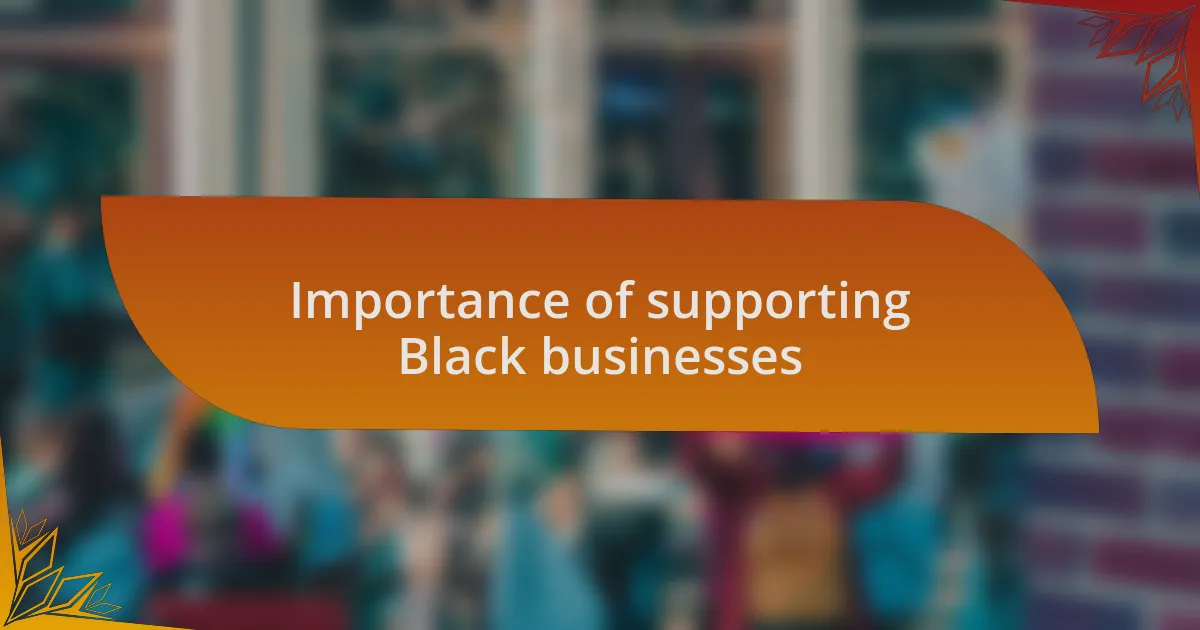
Importance of supporting Black businesses
Supporting Black-owned businesses is crucial for fostering economic empowerment within Black communities. I recall attending a community market where local entrepreneurs showcased their crafts and cuisines, which sparked conversations about cultural heritage and resilience. It struck me how these businesses serve as lifelines that not only stimulate local economies but also preserve unique cultural identities.
There’s a powerful ripple effect when we choose to support Black businesses; it nurtures job creation and wealth accumulation in communities historically deprived of such opportunities. I remember chatting with a shop owner who shared how her business had transformed her family’s future. It emphasized to me that each purchase is more than an exchange of goods; it’s a statement of solidarity and a step toward economic justice.
When I think about the broader implications, I realize that backing Black-owned businesses contributes to dismantling systemic barriers. Aren’t our daily choices a reflection of our values? By elevating these enterprises, we challenge the status quo and lay a foundation for equitable access to resources and opportunities. Every investment in these businesses is a brick laid in the pathway toward repair and regeneration, not just economically, but socially and culturally as well.
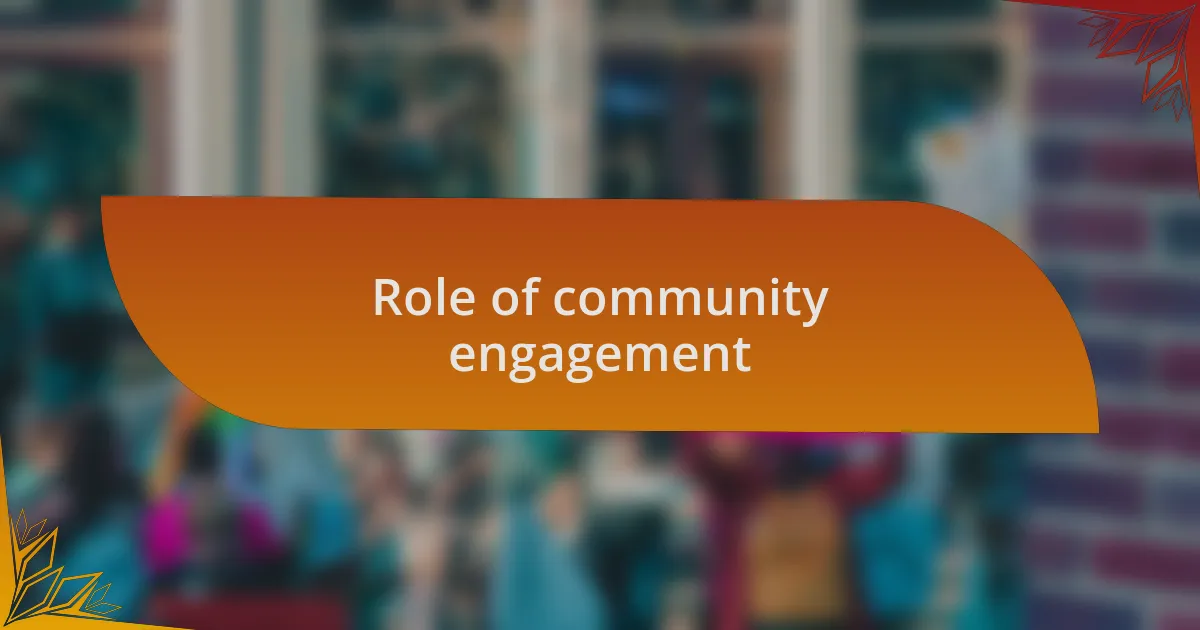
Role of community engagement
Engaging with the community is vital when it comes to supporting Black-owned businesses. I fondly remember participating in a local workshop where we brainstormed ways to uplift neighborhood entrepreneurs. The excitement in the room was palpable as we discussed mutual support strategies—like pooling resources or organizing pop-up events. It made me realize that community engagement transforms individual efforts into collective power.
Moreover, the relationships built through community involvement create a network where knowledge and experience flow freely. I once attended a mentorship event where established business owners shared their journeys with aspiring entrepreneurs. Witnessing the spark in the young attendees’ eyes as they learned from real-life experiences reaffirmed my belief that mentorship can be a game-changer, fostering growth and confidence in new ventures.
If we genuinely want to create lasting change, we must actively participate in nurturing our local economy. I often reflect on how simple actions, like attending a community event or sharing a business on social media, contribute to a larger movement. Aren’t we all responsible for building a future that promotes equity and opportunity? Engaging with our community can catalyze real transformation, reinforcing the bonds that make us resilient together.
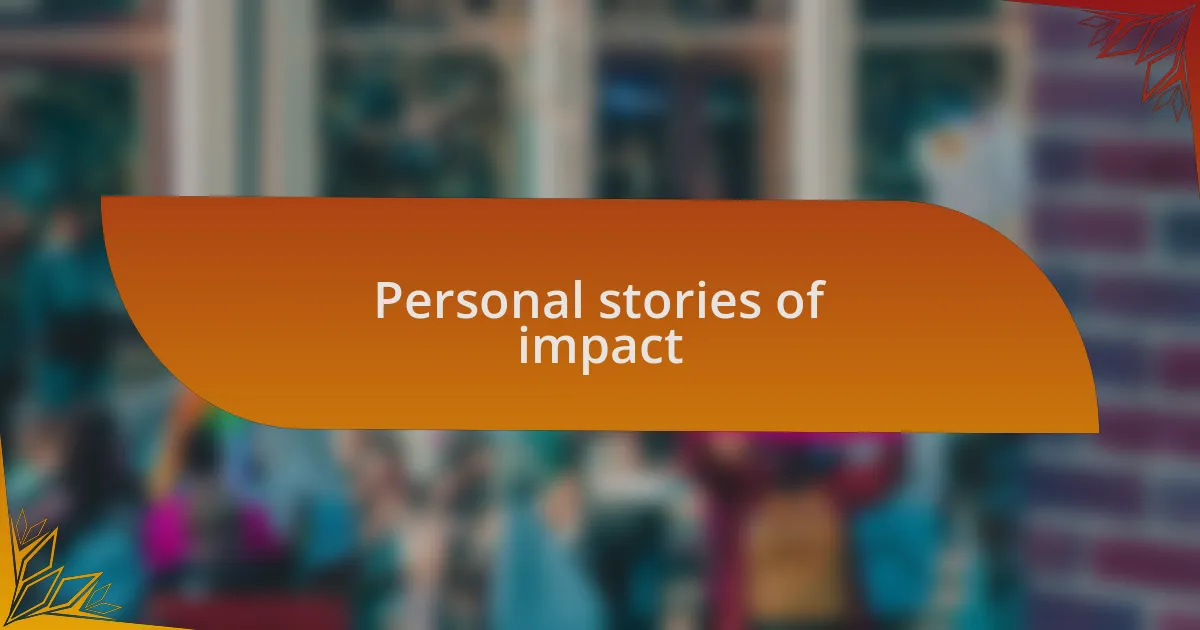
Personal stories of impact
Experiencing the impact of supporting Black-owned businesses firsthand has been truly transformative for me. I remember visiting a local café owned by a Black entrepreneur, and the warmth and authenticity of the place struck me instantly. As I sipped on my coffee, I learned that every purchase helped fund community initiatives, igniting a deeper connection within our neighborhood. It made me proud to spend my money where it mattered, knowing I was contributing to a cause larger than myself.
Another memorable moment occurred during a community art show featuring only Black artists, hosted in an underutilized space in my town. The atmosphere buzzed with creativity and pride as artists shared their stories through their work. I felt a rush of emotions as I recognized the importance of supporting these creatives—not just for the art itself, but for the narratives they represent. In that moment, I understood that investing in Black-owned businesses enriches our culture and diversifies our shared experiences.
Reflecting on these personal encounters, I often ask myself: how can I continue to support and uplift these businesses? Each time I make a purchase or share a story from my experiences, I feel compelled to advocate for the wider community. It’s not just about transactions; it’s about forging connections that empower us all, and I find great joy in being part of this movement.
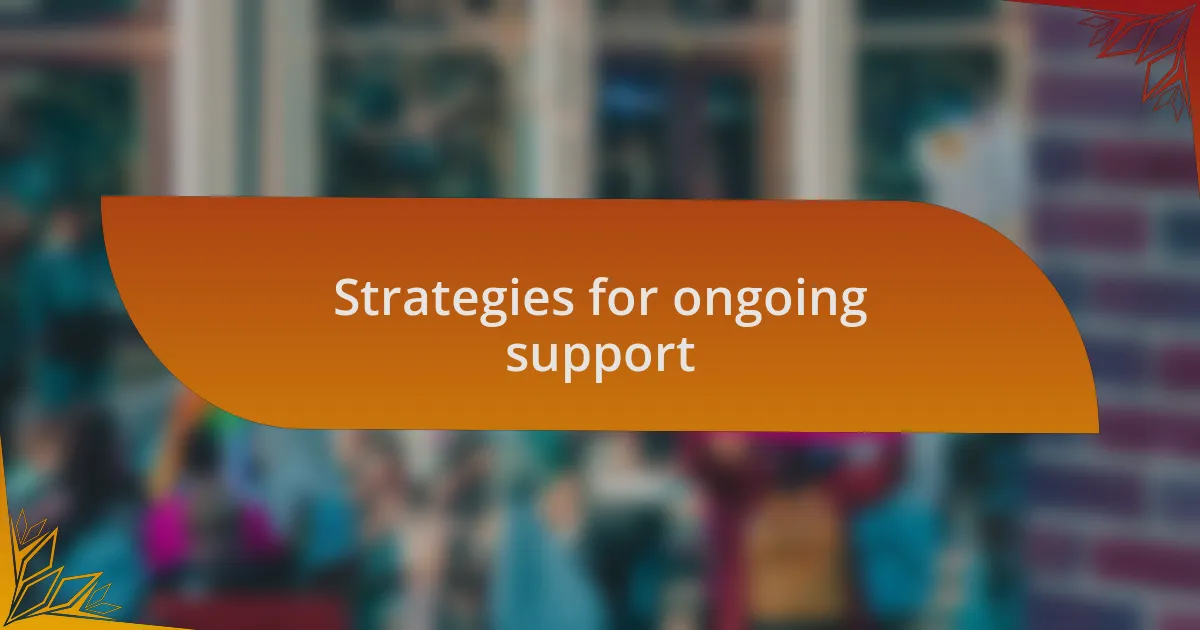
Strategies for ongoing support
When I think about ongoing support for Black-owned businesses, I realize it’s crucial to cultivate relationships over mere transactions. For instance, I developed a close friendship with a local tailor who beautifully transformed my clothes. I didn’t just bring my items for alterations; I became a regular customer, attending his community events and introducing him to friends. This deepened my understanding of the struggles he faced, and it reminded me that my support extends far beyond my purchases.
Another strategy I’ve embraced is actively promoting these businesses on social media. I remember sharing a post about a Black-owned bookstore that brought me so much joy. The moment my friends began tagging their friends, I felt an exhilarating sense of community building. It made me ponder: how can we create a ripple effect of awareness and support just by sharing our favorite finds? It’s rewarding to contribute to a larger dialogue and recognize the unique value these businesses hold in our society.
Additionally, I try to engage in regular dialogue with business owners. During one visit to a Black-owned hair salon, I spent hours not only getting my hair done but also discussing ways to attract more clientele to the area. I left feeling empowered, not just as a customer but as a part of their journey toward growth. How often do we think about the power of our words and ideas? Supporting Black-owned businesses is about lifting each other and working towards a shared vision of prosperity.
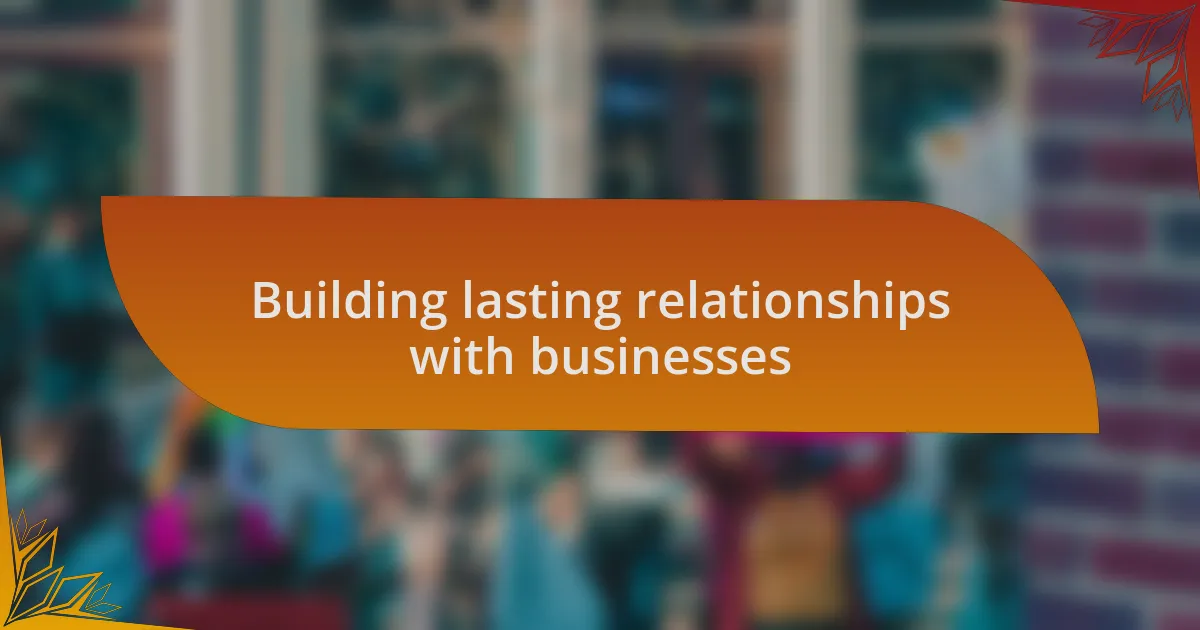
Building lasting relationships with businesses
Building lasting relationships with Black-owned businesses goes beyond supporting them financially; it’s about really knowing their stories and investing in their journeys. I remember a memorable evening spent at a pop-up event for a Black-owned art gallery. I started chatting with the owner, who passionately shared her vision for uplifting local artists. That conversation inspired me to not only purchase a piece of art but also to help organize a future event that showcased more talent from our community. It was in that moment I realized connections like these can make a tangible difference.
Trust and familiarity can transform the client-business dynamic. One time, I opted to bring my family to a family-owned restaurant that had just opened. The owner not only recognized me but also took the time to suggest meals based on my family’s preferences. Through this, I realized that every visit became an opportunity to deepen our relationship. Where else can I find such personalized service that reflects true understanding? Seeing them thrive makes me feel that I’m an integral part of their story.
Moreover, I often find that loyalty can be reciprocated in unexpected ways. After consistently supporting a local bakery, I was overjoyed when the owner invited me to a tasting event to share her new recipe ideas. That invitation wasn’t just about the baked goods; it felt like an acknowledgment of my support and a sincere effort to involve me in her business journey. Have you ever felt that rush of excitement when you realize you’re not just a customer, but a valued member of a shared vision? Being part of this vibrant community drives me to continue nurturing these relationships.